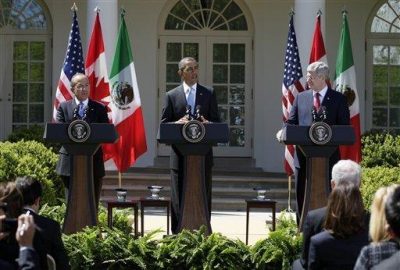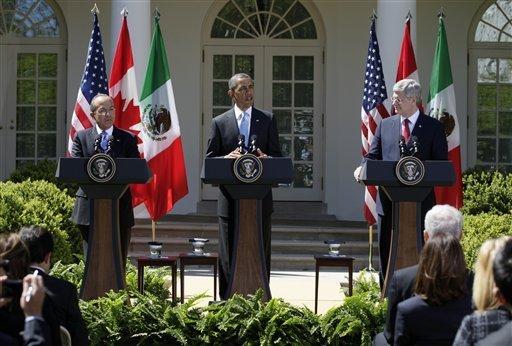Experts available to discuss the failed promises of Obama’s policies towards Canada and Mexico
Manuel Pérez Rocha, Institute for Policy Studies, (240) 838-6623
Lacy MacAuley, Institute for Policy Studies, (202) 445-4692
Washington DC – In a very quiet meeting today, the White House hosted the “three amigos,” President Obama, Mexican President Felipe Calderon, and Canadian Prime Minister Stephen Harper. Unlike the days of President George W. Bush, there will be no photo-ops with sombreros or great fanfare this time.

arack Obama, Felipe Calderon and Stephen Harper. AP photo.
President Obama promised on the campaign trail (in February 2008) that his meetings with the leaders of Mexico and Canada, “unlike similar summits under President Bush,” would be “transparent” and would involve “citizens, labor, the private sector and non-governmental organizations in setting the agenda and making progress.” However, not even the agenda of this summit has been made public.
The White House states that the “The North American Free Trade Agreement (NAFTA) signatories will focus on economic growth and competitiveness, citizen security, energy and climate change.” Notwithstanding that these are all issues in which the civil society organizations of the three countries have deep concerns and much to say, they are not involved.
For instance, many Mexican and U.S. organizations have denounced the increased U.S. military aid to Mexico, insisting that the security crisis in Mexico is not a problem that has a military solution. Rampant violence has taken more than 50,000 lives in Mexico, and the poor human rights record of the Mexican military (complaints received by Mexico’s National Human Rights Commission of human rights violations by Mexican soldiers have increased almost six fold since 2007). The Commission has determined that Mexican soldiers have been responsible for over 30 unlawful killings, more than 200 cases of torture and multiple cases of rape, among other crimes. Despite these violations, the Department of Defense has gradually increased its assistance to Mexico. (For the fiscal year 2012 DOD direct and indirect support to the Mexican military may be more than $75.5 million.)
“The so called ‘drug war’ has become a nightmare for all three countries, especially Mexico,” said Carleen Pickard, Executive Director of Global Exchange, the San Francisco based human rights organization. “A growing movement that includes former presidents of Mexico, Colombia and Brazil think ending drug prohibition is central to any genuine solution to soaring violence. Obama, Harper and Calderón need to get real about it too.”
Also, NAFTA has done nothing to alleviate poverty in Mexico, which together with Honduras is the only country in Latin America that saw an increase of poverty in 2010.
“Felipe Calderon’s presidency will be remembered for its dismal record on human rights, a result of his ill-conceived militarization of Mexico, as well as for throwing 5 million Mexicans into poverty,” stated Manuel Pérez Rocha, Associate Fellow at the Institute for Policy Studies and Mexican national.
Canadians also have concerns.
“The Canada-US Beyond the Border action plan is based on the decade-old delusion that if we just lower environmental and food standards a little more while hiking security and surveillance we will all prosper,” said Stuart Trew of the Council of Canadians. “We need a brand new model of North American cooperation that will tackle inequality, climate change and resource depletion.”
It is expected that Harper will pressure Obama to carry on with the plan originated under the defunct Security and Prosperity Partnership for a transnational pipeline sucking oil from the tar sands of Canada onto the United States with great environmental peril. As Raul Burbano, coordinator of Common Frontiers has said, “Indigenous groups, civil society and NGO’s on both sides of the border all oppose the Keystone Pipeline, yet the Harper government of Canada feels it’s a ‘complete no-brainer’ and continues to put corporate interests ahead of environmental justice.”
After backpedaling on his promises to renegotiate NAFTA and involve civil society in North American relations, Obama’s hushed approach at this summit may reflect a certain level of embarrassment over unfulfilled promises.
# # #
Institute for Policy Studies (www.ips-dc.org) is a community of public scholars and organizers linking peace, justice, and the environment in the U.S. and globally. We work with social movements to promote true democracy and challenge concentrated wealth, corporate influence, and military power.
www.ips-dc.org
